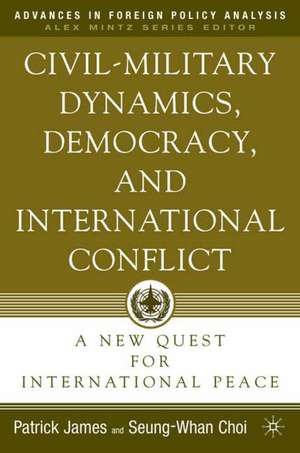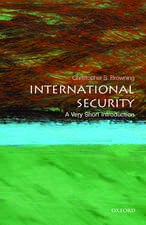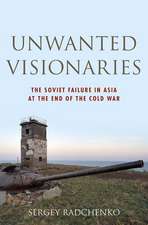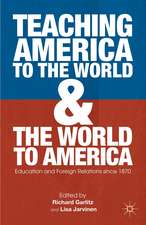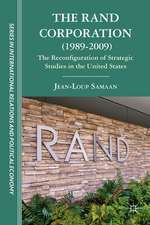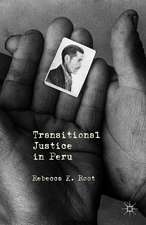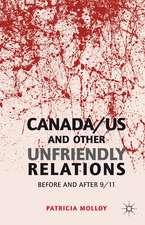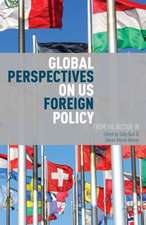Civil-Military Dynamics, Democracy, and International Conflict: A New Quest for International Peace: Advances in Foreign Policy Analysis
Autor P. James, S. Choien Limba Engleză Hardback – 11 mai 2005
| Toate formatele și edițiile | Preț | Express |
|---|---|---|
| Paperback (1) | 381.00 lei 6-8 săpt. | |
| Palgrave Macmillan US – 9 noi 2015 | 381.00 lei 6-8 săpt. | |
| Hardback (1) | 386.00 lei 6-8 săpt. | |
| Palgrave Macmillan US – 11 mai 2005 | 386.00 lei 6-8 săpt. |
Preț: 386.00 lei
Nou
Puncte Express: 579
Preț estimativ în valută:
73.88€ • 80.28$ • 62.10£
73.88€ • 80.28$ • 62.10£
Carte tipărită la comandă
Livrare economică 21 aprilie-05 mai
Preluare comenzi: 021 569.72.76
Specificații
ISBN-13: 9781403964854
ISBN-10: 1403964858
Pagini: 224
Ilustrații: XIV, 197 p. 9 illus.
Dimensiuni: 140 x 216 x 25 mm
Greutate: 0.37 kg
Ediția:2005
Editura: Palgrave Macmillan US
Colecția Palgrave Macmillan
Seria Advances in Foreign Policy Analysis
Locul publicării:New York, United States
ISBN-10: 1403964858
Pagini: 224
Ilustrații: XIV, 197 p. 9 illus.
Dimensiuni: 140 x 216 x 25 mm
Greutate: 0.37 kg
Ediția:2005
Editura: Palgrave Macmillan US
Colecția Palgrave Macmillan
Seria Advances in Foreign Policy Analysis
Locul publicării:New York, United States
Cuprins
Introduction: Quadrangulating the Peace Democracy, Peace and Other Things Foreign Policy Decision-Making: A Process Model Research Design: A Look Beyond the Triangular Peace Accounting for Militarized Interstate Disputes Accounting for Militarized Interstate Dispute-Related Casualties Is the Pen Mightier Than the Sword? Conclusions and Policy Implications Appendices
Recenzii
"Sound, solid scholarship creatively exploring and extending research on a timely and timeless topic. Must reading for all students of democratic peace theory and its applicability to contemporary diplomatic practice."
- Charles W, Kegley, Pearce Professor of Internartional Relations, University of South Carolina, and President, International Studies Association (1993-1994)
"A New Quest for International Peace carries the democratic peace research program in new and productive directions. Focusing on previously understudied causal mechanisms, the authors find that dyads with low military influence over policy choices and with media that are free to operate without government controls are less likely to become involved in military disputes or suffer high fatalities. Because civil-military relations and media openness are susceptible to influence in a manner that deeper structural factors are not, the findings provide practical policy guidelines to minimize the escalation of interstate conflicts and the results of this research should interest both scholars and policymakers."
- Stephen G. Walker, Arizona State University
"A New Quest for International Peace by Seung-Whan Choi and Patrick James presents a valuable literature review, an original model and provocative ideas that extend and deepen our understanding of one of the pivotal concepts in International Relations, the democratic peace. Their foreign policy decision-making model consists of four crucial factors that have been neglected in explanations of the link between regime type and the propensity to peace/war: civil-military relations, military manpower systems, diplomatic channels and media openness. The model is tested with a sophisticated research design over a long period of international history. As such, the theory and evidence in this book constitute an important contribution to the systematic study of international conflict, crisis and war."
- Michael Brecher, R.B. Angus Professor of Political Science, McGill University
"This an important addition to the literature on the causes of war. It confirms much of the past work on the Kantian or liberal peace, challenges some previous findings, and extends this research in interesting, useful new directions. Perhaps the most important finding is that democracies seem better able to signal their capabilities and intentions and thus avoid the use of force. This important book provide practical guidance for policy makers hoping to shape a more peaceful world." - John R. Oneal, University of Alabama
- Charles W, Kegley, Pearce Professor of Internartional Relations, University of South Carolina, and President, International Studies Association (1993-1994)
"A New Quest for International Peace carries the democratic peace research program in new and productive directions. Focusing on previously understudied causal mechanisms, the authors find that dyads with low military influence over policy choices and with media that are free to operate without government controls are less likely to become involved in military disputes or suffer high fatalities. Because civil-military relations and media openness are susceptible to influence in a manner that deeper structural factors are not, the findings provide practical policy guidelines to minimize the escalation of interstate conflicts and the results of this research should interest both scholars and policymakers."
- Stephen G. Walker, Arizona State University
"A New Quest for International Peace by Seung-Whan Choi and Patrick James presents a valuable literature review, an original model and provocative ideas that extend and deepen our understanding of one of the pivotal concepts in International Relations, the democratic peace. Their foreign policy decision-making model consists of four crucial factors that have been neglected in explanations of the link between regime type and the propensity to peace/war: civil-military relations, military manpower systems, diplomatic channels and media openness. The model is tested with a sophisticated research design over a long period of international history. As such, the theory and evidence in this book constitute an important contribution to the systematic study of international conflict, crisis and war."
- Michael Brecher, R.B. Angus Professor of Political Science, McGill University
"This an important addition to the literature on the causes of war. It confirms much of the past work on the Kantian or liberal peace, challenges some previous findings, and extends this research in interesting, useful new directions. Perhaps the most important finding is that democracies seem better able to signal their capabilities and intentions and thus avoid the use of force. This important book provide practical guidance for policy makers hoping to shape a more peaceful world." - John R. Oneal, University of Alabama
Notă biografică
SEUNG-WHAN CHOI is Visiting Assistant Professor in the Department of Political Science at the University of Missouri, Columbia, USA.
PATRICK JAMES is Professor of Political Science at the University of Missouri, Columbia, USA.
PATRICK JAMES is Professor of Political Science at the University of Missouri, Columbia, USA.
